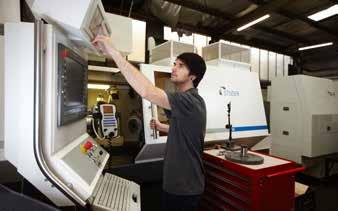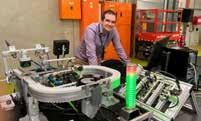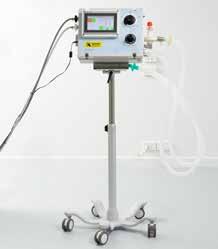
28 minute read
INDUSTRY NEWS Current news from the industry
from AMT OCT/NOV 2020
by AMTIL
Ronson Gears shoots for the stars with Lockheed Martin
Satellites produced by Lockheed Martin will carry Australian-made precision gear components into space, manufactured by Melbourne-based Ronson Gears.
In the last year, Lockheed Martin has signed five contracts with Ronson Gears under its Global Supply Chain (GSC) Program agreement with the Commonwealth. This makes the gear manufacturer, headquartered in Highett, Victoria, the first-ever Australian company to supply precision gear components that will be carried into space. Ronson is providing prototype gears for the Common Solar Array Drive Assembly (CSADA), which will be utilised on several Lockheed Martin satellite platforms. The CSADA performs key functions, including the deployment and rotation of the solar cell arrays that power the spacecraft. This helps ensure they remain optimally positioned towards the Sun. Additionally, Ronson has been awarded a contract for the delivery of anti-backlash output gears. Designed to perform with tight tolerances, these components will be integrated into a subassembly that will be used on several New is the most recent graduate of Lockheed Martin’s Program satellite programs. Management Institute (PMI), with Australia being the only non-US “The agreements with Ronson Gears reinforce Lockheed Martin’s market approved for non-Lockheed Martin employees to attend. commitment to developing Australia’s space sector,” said Joe North, Because of the pioneering work that companies like Ronson Gears Lockheed Martin Australia Chief Executive. “Our collaboration with have accomplished, Lockheed Martin Space procurement teams local research and industry partners, like Ronson, demonstrates are continually scanning Australia to identify potential technology that Australia has the capabilities here and now to participate in partners for its global supply chains. This includes everything from Space.” machined parts to software and even propulsion technologies. Lockheed Martin follows a rigorous qualification process to “The Global Supply Chain (GSC) Program is uniquely Australian ensure gold-standard manufacturing practices. It’s critical that and provides the local market with access to Lockheed Martin’s the components it uses are designed to withstand the extreme global programs,” added Christopher Hess, Head of Industrial environment of space. Ronson Gears met these standards and Development, Lockheed Martin Australia. “We’re continuously demonstrated its ability to maintain precision over the lifetime of identifying new opportunities for Ronson Gears to contribute to our the spacecraft. missions, and applaud their dedication to supporting innovative “Coming from the automotive industry, it was important that we initiatives such as IoT technologies.” prioritise innovation and invest in digital technologies that could These agreements also represent downstream supply chain enhance precision across our production processes – especially for opportunities for Ronson Gears’ partners, including Heat Treatment a Space environment,” commented Gavin New, General Manager, Australia and Electromold Australia. Their hardening processes Ronson Gears. “From our first introduction, Lockheed Martin has and magnetic particle inspection, respectively, are evidence of the been collaborative and supported our vision. We’re proud to be the world-class capabilities available in Australia to the space industry. first Australian company to supply precision gear components that will be carried into space.” www.ronsongears.com.au Nine in ten Australians believe Australia should produce more locally
New consumer research from Roy Morgan has found that nine in ten (89%) Australians believe Australia should be producing more products locally following the COVID-19 pandemic.
The research found that Australians’ key motivations to manufacture locally were to reduce Australia’s reliance on other countries (38%), create jobs (26%), support Australian business and industry (26%), a safeguard for vulnerable international supply chains (20%), and to strengthen Australia’s economy (16%). “Australia’s over-reliance on imported products has been highlighted during the COVID-19 pandemic,” said Australian Made Chief Executive, Ben Lazzaro. “This research indicates that Australians are placing priority on manufacturing self-sufficiency and job creation, along with a renewed appetite to address the imbalance between locally made and imported products, to ensure Australia’s long-term prosperity.” The preference for Australian-made products was already high before the COVID-19 pandemic, with Roy Morgan research in January finding 88% of Australians were more likely to buy products made in Australia. Since the pandemic, more than half of Australians (52%) say they now have an even higher preference for Australianmade products. Roy Morgan CEO, Michele Levine, said “The impact of COVID-19 on Australians is unprecedented in so many ways, not least of which is our shopping behaviour. More Australians are now organising delivery of products; doing online research prior to making a purchase; shopping online, both in stores they would usually visit and different stores. And critically since COVID-19, Australians have an ever greater preference for Australian Made products.” The research found that since the start of the pandemic, 37% of Australians are conducting more research online prior to purchasing products. Data from Australian Made’s website supports this finding, with traffic more than doubling in April to June compared to the same period prior.
UTS boost for Australian advanced manufacturing University of Technology Sydney (UTS)’s new Centre for Advanced Manufacturing (CAM) aims to support Australian manufacturing by helping it harness rapid technological change, develop competitive products and generate valuable jobs by meeting the challenges of Industry 4.0.
CAM will work closely with industry to understand how communication technologies, the Internet of Things (IoT) and data science can make manufacturing businesses more efficient and sustainable. A key driver of CAM is to give Australian manufacturers the skills to maintain and expand manufacturing activities in Australia, including supporting growth in the number of jobs. Centre Director Professor Jochen Deuse, from UTS’ School of Mechanical and Mechatronic Engineering, said CAM will be a bridge to the manufacturing industry, actively engaging with the profession and using consultation with leading industry experts to inform its strategic direction: “We want to be the first choice for industry collaboration and to supply graduates to work in a dynamic and agile industry.” CAM aims to become Australia’s leading research centre in advanced manufacturing, with access to advanced manufacturing facilities including UTS’ Tech Lab, ProtoSpace, and Industry 4.0 testbeds. UTS’ ambition is for it to be the number one choice as university collaborator for Australian manufacturers, with a reputation for fundamental and applied industry-relevant research with measurable impact. This will lead to a revolution in advanced manufacturing education, with graduates ready for the global workplace and future leadership in Australian manufacturing.

CAM is intended to act as a catalyst for strong, lasting industry partnerships, promoting increased self-sufficiency and onshoring of Australian manufacturing. The Centre is already working with partners such as Balluff Australia, Marley Flow Control, Siemens and RapidMiner, and on jointly-funded projects with Alrick Healthcare, Innovation Connections, Defence Innovation Network and Australian Wool Innovation. Balluff manufactures and distributes components for Industry 4.0 applications, and is also a major training provider. “We believe Balluff has a responsibility to the industrial automation industry to share the opportunities possible with current and emerging technologies,” said Balluff’s Managing Director Jason Bouyer. “Our challenge is how we inform the industry of these possibilities before they’re ready to accept them? Education will help overcome this and drive acceptance of innovative technologies that will propel Australian businesses to be relevant on a world scale.” Industry training will be at the core of CAM activities, developing novel and innovative approaches to manufacturing education with short courses that are dynamic and flexible, responsive to the quickly changing needs of industry. CAM will also lead UTS activities regarding the recently announced ARC Industrial Transformation Training Centre in Collaborative Robotics and the governmentfunded Pilot Associate Degree in Advanced Manufacturing.
$150K



INSTANT ASSET TAX WRITE OFF *
TAKE ADVANTAGE OF GOVERNMENT ASSET WRITE OFF TODAY
Your Specialist in New CNC Machines, Service & Support

Call us today for a quote 1300 252 262
Proud Partners
I
bjcmachinetools.com.au I BJCMachinetools I BJCMachinetools
*Extended until December 31, 2020. For full eligibility details please visit ato.gov.au
Businesses invest in tech to offset COVID-19 impacts
Epicor’s 2020 Global Growth Index has revealed that companies are embracing technologies to offset the impacts of global volatility and supply chain disruptions amid the COVID-19 pandemic.
Epicor’s Global Growth Index explores the growth trajectory of companies around the world and provides insight into how business leaders are using technology to drive growth. The index looks at the constantly changing state of growth in the manufacturing, distribution, retail and e-commerce industries along with what trends impact the bottom line. When surveying Australian respondents, the report’s findings included: • Increasing competitiveness: Most companies surveyed are using excellent customer service (42%) and big data analytics (47%) to increase competitiveness. Data analytics had already been in use for between one and five years for two-thirds of Australian respondents, and 92% said big data is driving growth. • Impacts on business growth in the coming year: The China
US trade dispute/tariffs (30%), environmental challenges (32%) and COVID-19 (66%) are most likely to negatively impact business growth over the coming year for Australian respondents. • Positive influences on business growth: Planning and strategy (40%), technology and IT infrastructure (34%) and brand reputation (29%) were said to have the biggest impact on their industries over the last 12 months. • Technologies set to have the biggest impact: 5G (37%), cloud technology (36%) and digital transformation (31%) were predicted to have the biggest positive, direct impact on energy transition in the manufacturing sector. The poll – conducted from 14-16 September – showed close to two-thirds (65%) of those surveyed supported taxpayer funds being used to transition the Australian manufacturing industry towards using clean renewable energy, while only 19% supported continuing to rely on fossil fuels such as gas. Just under one-third (31%) of Coalition voters support Australian manufacturing continuing to rely on fossil fuels like gas. The survey was conducted by YouGov on behalf of Oxfam Australia with a nationally representative sample of Australian voters. Releasing the survey results, Oxfam Australia Chief Executive Lyn Morgain said the poll found support for prioritising funding for the health sector was highest at 74%, while 47% supported prioritising public investment in the tourism industry, 46% in schools and universities, and 41% in renewable energy – almost three times as much as would prioritise gas. A majority (56%) opposed taxpayer money being spent on subsidising multinational gas companies and new gas infrastructure, with only 26% supporting subsidising of gas companies. Morgain said the Government should listen to taxpayers before investing their money at such a critical moment for the nation.
future growth in the respondents’ industries over the next 12 to 18 months. Andy Coussins, Senior Vice-President and Head of International at Epicor, said: “2020 has been a year characterised by significant disruption. These disruptions have accelerated the move towards digital transformation for many organisations; businesses will look to technology and IT infrastructure to drive company growth in the next 12 months. This continued investment will be important for organisations to maintain business resilience, adapt to global volatility, and stay flexible as the market changes.” Further results from the report reveal that: • Growth is strong: For 54% of Australian companies, growth in the past six months was a slight improvement over the previous six months. For 22%, recent growth was a significant improvement. Growth had slightly or significantly worsened for just 10% of Australian respondents. • Key success factors include digital: 26% of Australian companies said a strong digital and online presence was a key indicator of a successful growing business in their industry. • Overcoming challenges requires technology: 46% of
Australian respondents said working more efficiently would help them overcome business growth challenges in the next 12 months. 41% said it would come down to better planning
Poll reveals public favours manufacturing transition over gas-fired plan A new national poll has revealed that just 14% of Australian voters support the Federal Government prioritising the gas industry over other sectors in its plans to rebuild the economy, with strong approval for greater measures to support
and 40% said better technology was a key factor. “The Prime Minister’s move to put gas, a fossil fuel, at the centre of our recovery from COVID-19 is deeply concerning and clearly at odds with the wishes of the Australian people,” said Morgain. “Australians do not want their money to be spent on an industry that is uneconomic, provides few jobs and causes further damage to our climate. The market has made clear the lack of viability of fossil fuels through their reluctance to fund gas projects.” A briefing paper released by Oxfam in July, Australia’s energy future & the recovery from COVID-19, stated that gas was an “unstable foundation on which to rebuild an economy and build a better future”. Morgain said the Government risked imposing a crippling burden on future generations in the form of climate damage, stranded assets, fewer jobs and big debts. “We have an opportunity to take serious action to tackle climate change by investing in renewable energies, while stabilising and strengthening the Australian economy,” Morgain said. “Backing fossil fuels is a missed opportunity. Oxfam is calling on the Government to use the October 6 Federal Budget to scrap their plans for a fossil fuelled recovery, and instead invest in economic stimulus measures that accelerate the transformation of our energy system and economy.”
BIGGEST RANGE AUSTRALIA WIDE
COIL


OVER 3,000 ITEMS IN STOCK


TREADPLATE

SHEET BAR
STAINLESS STEEL • ALUMINIUM • COPPER • BRASS • BRONZE • NICKEL ALLOYS
Austral Wright Metals is Australia’s leading importer and distributor of stainless steel and aluminium sheet & plate. In addition to copper, brass, bronze, nickel alloys, duplex alloys, titanium alloys and speciality metals.
Call any of our Service Centres AUSTRALIA WIDE for further information
Sydney 02 9827 0790 • Melbourne 03 9409 8500 • Adelaide 08 8300 1800 • Perth 08 9258 2600
ICN Victoria announces new CEO Industry Capability Network (ICN) Victoria has announced the appointment of Dianne Smith as its new CEO.
On behalf of the ICN Victoria Board, Chamber of Commerce for the past Chairman Tim Piper confirmed the four years, and also as a member of the appointment on 10 September. He Victorian State Government’s Advanced acknowledged the significant contribution Manufacturing Advisory Council. Prior by outgoing Executive Director, Grant to that, she led the state’s peak body for Anderson, and thanked him for his tourism and events, the Victoria Tourism stewardship of ICN over the past two years. Industry Council. “As Victoria emerges from the substantial “With the current situation, and in line with impacts of COVID-19, the role of ICN and our Local Jobs First policy, it is certainly the growing local jobs and content could not be time to continue our State’s investment in of greater importance,” said Piper. “Grant Victoria’s future capability,” said Smith. “I’m has been a knowledgeable and excellent looking forward to working with the Board leader for ICN, and Dianne will build on this, and team, and playing an instrumental role bringing a fresh perspective for our future in Victoria’s recovery from the pandemic.” challenges.” Smith will commence work at ICN Victoria Smith brings impressive industry and in early November, with Anderson retiring government connections to ICN having from the role on 29 October. served as Chief Executive of the Melbourne Victorian manufacturers create lifesaving new ventilator industry

Ballarat manufacturer Gekko Medical has received permission to fast-track production of the ‘GeVentor’, an Australian-designed ventilator that could save the lives of COVID-19 patients around the world.
The Victorian State Government on 1 September announced an order for 170 of the units, after Gekko’s machine was provided with a production exemption from the Therapeutic Goods Administration (TGA). Gekko will now harness its local suppliers and 100-strong workforce to build the GeVentor ventilators, which will be among the first to go into production. They are expected to be available within five weeks and will be used in health services across the state. The GeVentor is an affordable alternative to the latest model ventilators, designed to be simple, robust and reliable. It features low gas and power consumption and can be operated using batteries and an oxygen bottle, making it ideal for more remote and regional health centres. A prototype for the GeVentor was developed in April by Gekko’s innovation team lead by technical director Sandy Gray, in consultation with Ballarat anaesthetist Doug Paxton. The initiative was in response to fears of shortages of ventilators in Australian hospitals. The development of the prototype was assisted by a Victorian government grant and support from the Ballarat community. “We are pleased to have developed a ventilator that can help save the lives of COVID-19 patients around the world, particularly in developing countries that don’t have the medical resources they need to cope with the pandemic,” said Gray. “It is a big success story for Ballarat and regional

Victoria, resulting from a collaboration between local medical and manufacturing experts, with the support of the community. We understand the GeVentor is the first Australian-designed ventilator to be eligible for supply in Australia specifically for the COVID-19 pandemic.” With Australia now in a strong position in the fight against COVID-19 due to low infection rates and the availability of ventilators, the GeVentor will be available to global hotspots, including Indonesia, India, and Latin America. The unit has attracted interest from humanitarian organisations that aim to supply ventilators to developing countries, with the affordability and rugged construction of the GeVentor of particular benefit in these settings.

Gekko Medical is a new medical start-up launched by the award-winning mining innovation company, Gekko Systems in response to shortages of ventilators in Australian hospitals at the beginning of the COVID-19 pandemic. It aims to use its manufacturing expertise to continue to produce medical equipment and create a medical technology hub in Ballarat. Health Purchasing Victoria has also placed orders for 200 ventilators that are being produced by Grey Innovation. The company established a consortium of local companies to build its transportable Notus Vivere Emergency Ventilator, with components coming from manufacturers ANCA, Marand, Hosico, Bosch Australia and Hydrix. Grey Innovation is also producing machines under licence to fill an order from the Commonwealth Government. Two other Victorian companies – Planet Innovation and Compumedics – are in the final stages of the TGA process for their ventilators. Minister for Industry Support and Recovery Martin Pakula commented: “Creating a local ventilator industry in a matter of just months is testament to the excellence and agility of Victorian manufacturers. We have seen an amazing response to the challenges posed by the pandemic and that has helped to shore up jobs and place the state in the best position possible to recover once the health crisis is behind us.”
RUAG Australia lands MRO contracts with US Navy for F/A-18
RUAG Australia has received the first contracts awarded by the US Navy under the AUSMIN Defence Acquisition Committee (ADAC) – a collaboration between the US and Australian Departments of Defence.
RUAG is the first Australian company to receive an award under the ADAC initiative covering the maintenance, repair and overhaul (MRO) of selected components for the F/A-18 Hornet fleet. RUAG is now a designated and approved source of repair for Navy Supply (NAVSUP) within the APAC Region under this program. “RUAG Australia appreciates the trust that the US Navy has placed in their ability to support their regional activities,” says Terry Miles, General Manager RUAG Australia. “RUAG’s MRO capabilities and track record of success with the Royal Australian Airforce (RAAF), will form the basis of a partnership with the US Navy to support the fleet readiness of the F/A-18 fleet in APAC and other Foreign Military Sales (FMS) customers moving forward.” ADAC is a senior bilateral forum for co-operation between the US and Australian Military, aiming to facilitate closer defence and industry collaboration related to the acquisition, logistics and followon support of defence equipment. “We are pleased and proud to be recognised as an essential contributor to defence industry capability,” said Stephan Jezler, Senior Vice President Aviation International, RUAG MRO International. “We are looking forward to applying our technical expertise to other fleets in the APAC region and globally. It confirms our good reputation and our vast experience and know-how on the life-cycle support of F/A18 fleets.” payload into space. UQ Space is designing and building ‘Project Asteria’, a rocket that will zoom past the Kármán Line, 100km above sea level, reaching speeds greater than Mach-5. With support from UQ aerospace engineering experts and industry partners including Queenslandbased Black Sky Aerospace, the 90-strong student team hopes to set a new world record. UQ Space Managing Director Myrthe Snoeks, an engineering and arts student, said the team had been working towards this ambitious goal despite delays caused by the global COVID-19 pandemic. “We started developing the rocket in 2019, and we are now planning and undertaking static testing and sub-orbital launch preparations before our official launch next year,” said Snoeks. “The UQ Space team has achieved so much already, having taken out the top position in Australia for competitive university rocket launches in 2019, only one year after establishing the team. “While 2020 has presented some additional challenges to our progress, we haven’t given up – we absolutely intend on achieving this goal with the help of our supporters.” UQ Space will be using the Beyond the Blue Aerospace launch and test facility near Goondiwindi in western Queensland, known as ‘Funny Farm Space’. This will be one of the first industry collaborations to take advantage of the $3m commitment from Black Sky Aerospace and Beyond the Blue Aerospace to encourage space ventures from Queensland. The launch facility is Australia’s only sub-orbital facility permitted to fly through and above controlled

RUAG Australia has been supporting the RAAF F/A-18 fleet and other platforms since the early 1980s. RUAG’s focus on engineering and technical expertise has built a comprehensive knowledge base achieving high quality standards and short lead-times enabling RAAF
World-first University of Queensland rocket headed to space
The University of Queensland could next year become the first university to fly a student-built rocket and scientific
and other end users to benefit from sustainable aircraft availability.

airspace and was home to Australia’s first commercial payload rocket launch by Black Sky Aerospace in 2018. Black Sky Aerospace Director Blake Nikolic said there were real benefits to working on Project Asteria. “Together we are advancing Australia’s space capabilities and showing the world that we’re here and we’re ready,” Nikolic said. “Working with these bright and committed students also helps us as we develop our internship program in this new industry, and provides our future employees with practical knowledge-based learning.” The team plans to travel to Goondiwindi in the coming months for their first static test fire of Project Asteria.
DESIGNED TO CUT
INDUSTRY NEWS ABOVE THE REST. NOW THAT’S APPLIED New two-year term for Women in STEM Ambassador Professor Lisa Harvey-Smith has been reappointed as the Federal Government’s Women in STEM Ambassador for an additional two years. Professor Harvey-Smith has played a central role in the Government’s efforts to encourage girls and women to study and work in science, technology, engineering and mathematics THINKING. “As Ambassador, Professor Harvey-Smith has driven social and cultural change and established herself as a public authority on STEM equity issues. She will continue to play (STEM) since her appointment as the inaugural an integral role in our efforts to remove barriers Ambassador in 2018. The Office of the Women and open up opportunities for women and girls in STEM Ambassador is a Government initiative in STEM, which will benefit the entire nation.” to address gender equity in STEM. It promotes Professor Harvey-Smith said she was awareness of STEM careers to young people, immensely proud of the work her team had parents and carers, and works with educators done over the past two years to increase the to challenge gender stereotypes and promote participation of women and girls in STEM. “We inclusive and engaging STEM education for all. are now determined to accelerate this progress With her reappointment, Harvey-Smith and as we bring together industry, organisations her team will continue working across industry, and educational providers to deliver the government, research and education to address recommendations of the Women in STEM gender equity in STEM. Announcing the reappointment, Minister for Decadal Plan and the Government’s Advancing Women in STEM Industry, Science and Technology Karen Andrews praised Harveystrategy,” Professor Harvey-Smith said. Smith for the work she had already done and the challenge ahead: The Ambassador and her team will continue to be based at the “Professor Harvey-Smith shares my passion for advancing women University of New South Wales. The Government is providing $3m and girls in STEM and is an outstanding role model. over 2018-19 to 2021-22 for the Women in STEM Ambassador
Hawkei ready to enter full rate production
The Australian Army’s new Australian-designed and built Hawkei protected vehicle is ready to enter full-rate production at Thales’ Protected Vehicles facility in Bendigo, Victoria.
The vehicle’s production will support more than 200 local jobs in Bendigo as well as more across the national defence industry. Defence Minister Linda Reynolds CSC said the vehicle had performed exceptionally well throughout comprehensive ballistic and blast testing, meeting Defence’s stringent requirements for protection. “This is a highly effective capability being delivered in partnership between Defence and industry that builds on Thales’ iconic Bushmaster, which has been highly successful in operations overseas and exported around the world,” said Reynolds. “The Hawkei is a significant enhancement to existing land capability that will provide superior mobility, survivability and communications, while protecting the lives of our soldiers when operating in increasingly lethal and complex environments. This is yet another example of Defence and defence industry managing business practices in a COVID-19 safe manner to continue delivering ADF capability.” Under project LAND 121 Phase 4, 1,100 Hawkei vehicles and 1,058 associated trailers will be delivered, with the full rate production vehicles expected to commence delivery from mid-2021. Melissa Price, Minister for Defence Industry, said: “The manufacture and ongoing support of the Hawkei vehicle creates significant longterm opportunities for Australian industry, including potential export opportunities, as we have seen with the Bushmaster vehicles. This Government is investing in the skills and knowledge base of Australia’s defence industry and delivering an internationally competitive and sustainable sovereign Defence industry.” Eighteen of Thales’ key 25 suppliers are based in Victoria, including: • Albins Performance Transmissions, based in Ballarat, for the vehicle cross drive, steering rack, castings and shafts. • Flexible Drive Agencies, based in Oakleigh, for the wiper and gear selector assembly. initiative. www.womeninstem.org.au With its extreme accuracy, speed and consistency of cut, combined with very low operating costs, the new Yawei HLF fiber laser is the perfect way to take your business to the next level.

Dollar for dollar, the new HLF is in a league of its own, opening up possibilities for companies • all across the laser cutting sector; from start-ups through to full production, 3-shift Thomas Warburton, based in Dandenong South, for fasteners and hardware. • environments. Gough Transport Solutions, based in Noble Park, for the pneumatic system. With a quality German built Precitec auto-focus cutting head, IPG laser source, Siemens Defence plans to fit a quantity of the Hawkei protected mobility vehicles with the Electro Optic Systems Remote Weapon Stations. 840DSL controller and a fabricated, stress-relieved fully annealed frame it really is a cut above The CEATAC radar, designed and built by CEA Technologies in the rest. Canberra, is also capable of being fitted onto the Hawkei utility vehicle and trailer. Senator for Victoria Sarah Henderson said the vehicle’s production is a welcome boost to the Victorian economy: “Approximately 50 vehicles per month will be manufactured out of the Thales Protected Vehicles facility in Bendigo until mid-2022. The Hawkei’s production For more information: will sustain around 210 jobs in Thales’ workforce in Bendigo, and Call: 03 9706 8066 around 180 additional jobs nation-wide as part of Thales' supply chain. Email: sales@appliedmachinery.com.au Visit: www.appliedmachinery.com.au “For many small-to-medium enterprises, work on the Hawkei has provided business continuity and enabled investment in people and facilities, as well as diversification into other Defence projects and adjacent industries.”
South-west WA gears up for potential new advanced manufacturing hub The Western Australian Government is allocating $485,000 towards a study that will examine the feasibility of establishing an advanced manufacturing hub in the state’s South-West region.
Regional Development Minister Alannah the industry has the potential to grow, build MacTiernan announced on 3 September that capability and become more competitive.” the State Government will take the next steps in There has been a groundswell of local support for exploring the viability of the proposed hub. It is the South West Development Commission-coenvisioned a facility in Bunbury Geographe would ordinated project. Industry and local government give manufacturers an edge when competing for organisations will also be contributing funding work by providing local access to infrastructure, towards the study, as well as participating on a technology, training, education and research. steering committee. The announcement of the The State Government has identified technology study follows on from industry roundtables held in and advanced manufacturing as a priority Bunbury. economic sector that will help to grow and diversify “I am a big believer in the capabilities of our local the economy, create jobs, and secure WA’s future. businesses including in advanced manufacturing - By boosting business capability and capacity to develop new supply chains that would capitalise on global markets, the hub would support hundreds Western Australia Regional Development Minister Alannah MacTiernan. and I believe there is room to expand this sector,” added Don Punch, Member of the Legislative Assembly for Bunbury. “The South-West region of future jobs, including apprenticeships. with its access to port, rail and road supply chain “We have the capability to be manufacturing much more than we infrastructure, available industrial land, highly trained workers, and currently do in WA,” said MacTiernan. “We know that the skills local supplies of key minerals and other resources is ideally placed and services developed by our mining expertise can drive local to host a manufacturing hub. It is fantastic to see State Government, manufacturing. We are inspired by success stories of numerous local government and the private sector coming together for the South West advanced manufacturers. This study will show where good of the local economy and creating the jobs of the future.”
Major skills funding boost for defence industry
The Federal Government has bolstered its investment in growing the skills of Australia’s defence industry by significantly increasing funding to its Skilling Australia’s Defence Industry (SADI) grants program.
Companies will be able to apply for skills grants from a funding pool that has been expanded from $4m per year to $17m per year, to the end of 2021-22. The increased funding is intended to support a skilled workforce in the defence industry sector as part of the Federal Government’s response to the COVID-19 pandemic. Minister for Defence Industry, Melissa Price said the additional investment would help Australian defence industry retain and expand relevant workforce skills to support Defence’s most critical capabilities. “This will provide more funding for skilling and training opportunities, supporting small to medium sized enterprises across a range of trade, technical or professional skillsets,” Minister Price said. “The boost to SADI funding will give smaller businesses the confidence economic recovery from the coronavirus pandemic.
Minister for Training and Skills and Higher Education, Gayle
Tierney, announced on 13 September that every TAFE in Victoria will share in $55m to carry out essential upgrades to learning facilities and amenities, as well as to refit and modernise existing learning spaces to adapt them to deliver more courses. All
Victoria’s 12 TAFEs will share in the funding through the TAFE Asset
Maintenance Fund, with 30 projects to be delivered through the package. An extra 18,000 Victorians will be able to train at TAFEs and Learn Locals under a $163m package of new measures, to continue developing the skills of their employees during these uncertain times. “The funding will also help industry associations facilitate skills training for smaller defence industry businesses. Our support for skills training is part of our plan to develop the workforce needed to deliver on our ambitious $270bn investment in Defence capability.” Minister Price said she was pleased to support local businesses to help them boost skills needed for new jobs in the sector. “Our Defence investments will deliver a generation of jobs in an exciting new world of advanced manufacturing and innovation,” Minister Price said. “Australia’s defence industry had world-leading capabilities and we want to help them to broaden and deepen their
Victoria announces TAFE upgrades
The Victorian Government has announced upgrades to TAFEs across the state in a bid to create jobs and drive
skills base to meet Defence’s needs.” which includes an expansion of the State Government’s Free TAFE program to prepare the state’s economic recovery from the coronavirus crisis. “These projects will deliver better facilities for students and staff, and support jobs and local businesses through the pandemic,” said Minister Tierney. “Every TAFE in the state will share in funding to deliver these critical upgrades and ensure students can access high-quality local TAFEs.”
Flexibility for small diameters
Modular system Coromant EH
Reaching parts of the component that are difficult to access and keeping the tool assembly as short and compact as possible is critical for profitable metal cutting. The modular system Coromant EH enables you to get the most out of your cutting edge. Get the required reach and accessibility with shanks and modular adaptors. In short overhang applications, it is possible to double your productivity with integrated machine adaptors.
Contact your local Sandvik Coromant representative for more info on full product range.











